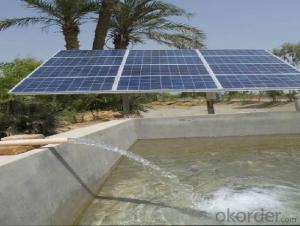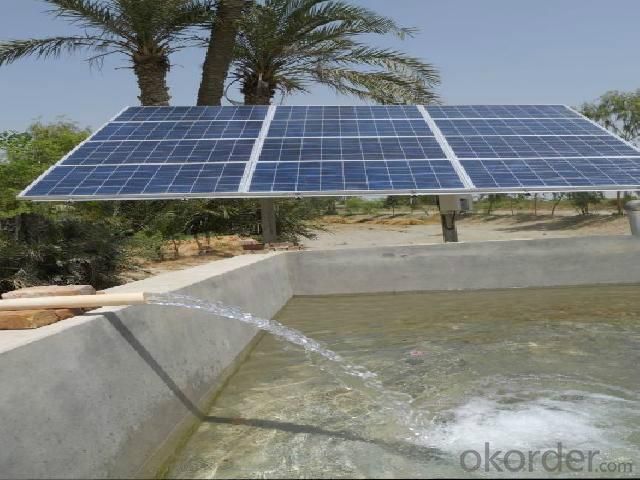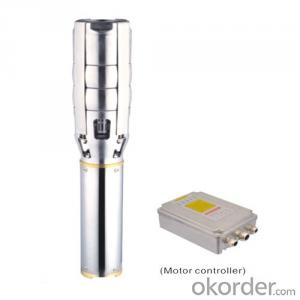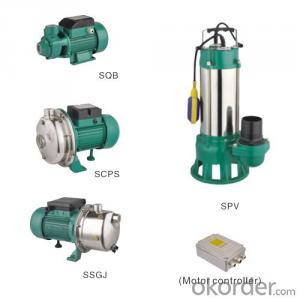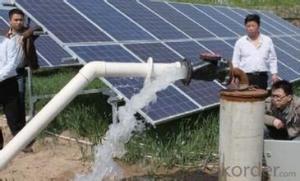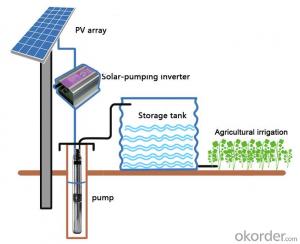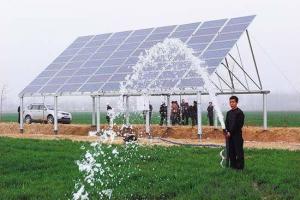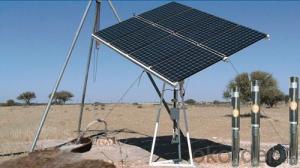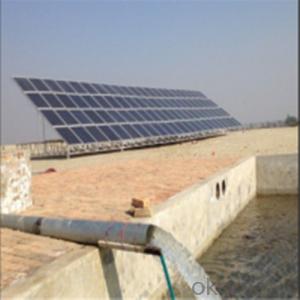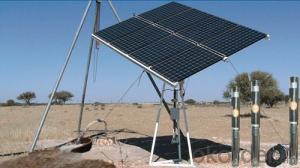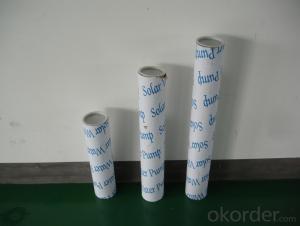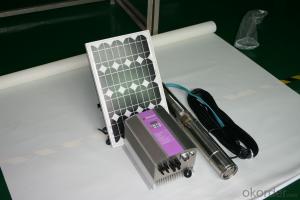Solar Pump Water Fountain - Cheap Solar Panels for Solar Pool Heating and Solar Water Pumping
- Loading Port:
- Shanghai
- Payment Terms:
- TT OR LC
- Min Order Qty:
- 1 set
- Supply Capability:
- 1000 set/month
OKorder Service Pledge
OKorder Financial Service
You Might Also Like
Cheap Solar Panels Solar Pool Heating Solar Water Pumping
DC solar water pumping system consists of the motor, pump, controller, solar array and some other accessories, such as water level sensor, float switch, etc. Considered that storing water is more efficient than storing electricity, the system is designed to directly drive the pump without battery which can reduce the construction and operating cost and routine maintenance effectively.The PV array consists of multiple solar panels connected in series/parallel, which can supply the whole system as power source by converting the absorbed solar radiation energy to the electrical energy. The pump driven by a brushless DC permanent magnet motor draws water from deep-well or river. The pumped water is then fed into reservoir or water tank, or connected to the irrigation system or fountain system directly.
Advanced Technology
Applications Innovation
The efficiency of DC brushless permanent magnet motor has been increased up to 25% in comparison with traditional asynchronous motor.
Technology Innovation
Stator and rotor are sealed by environment friendly casting resin.Motor insulation resistance can be hold higher than 300MΩfor more than 10 years, which consumedly increased the security and reliability of the submersible motor.
Structure Innovation
Casting resign technology processed stator and rotor as well as the water lubricated bearing make the submersible pump environment friendly.
Feature
High Efficiency & High Reliability
DC Brushless Permanent Magnet Motor
Minimum Maintenance, long Service Life
Environment Friendly Materials, Lubricated Without Oil
Application
Village or Family Water Supply
Animal Drinking Water & Livestock Watering
Garden/Courtyard Irrigation
Swimming Pool
Water Supply for Bivouac or Camping Car
Water Supply for Remote Area
Automatic Control
Operate Automatically, No Need Watching
Maximum Power Point Tracking (MPPT)
Dry-run Protection
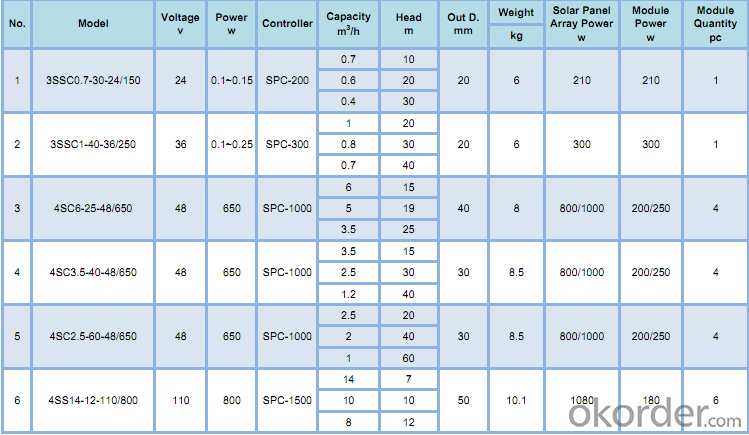
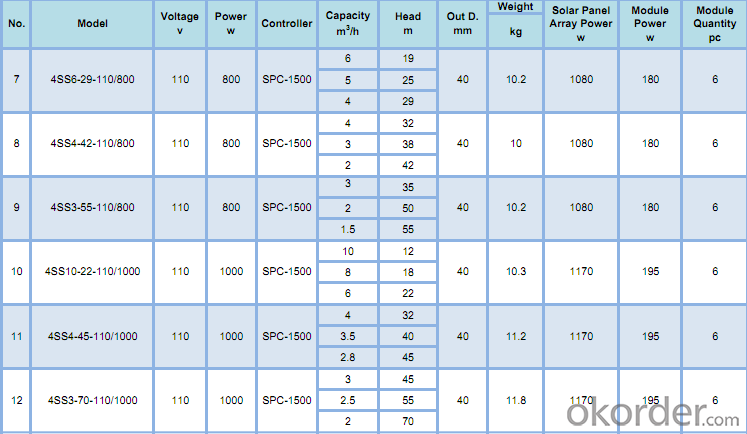
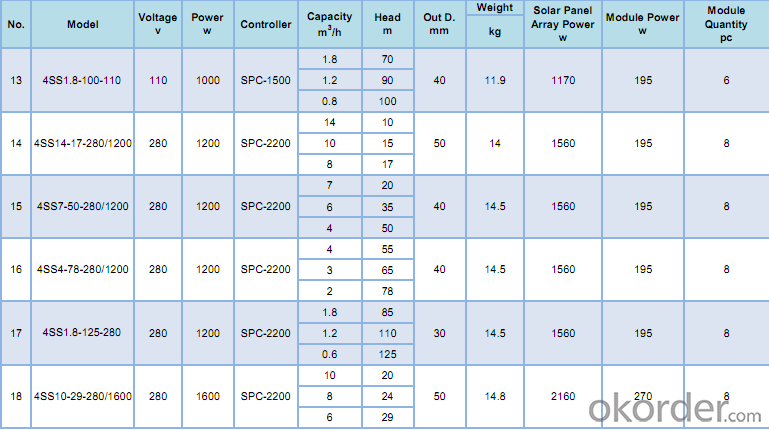
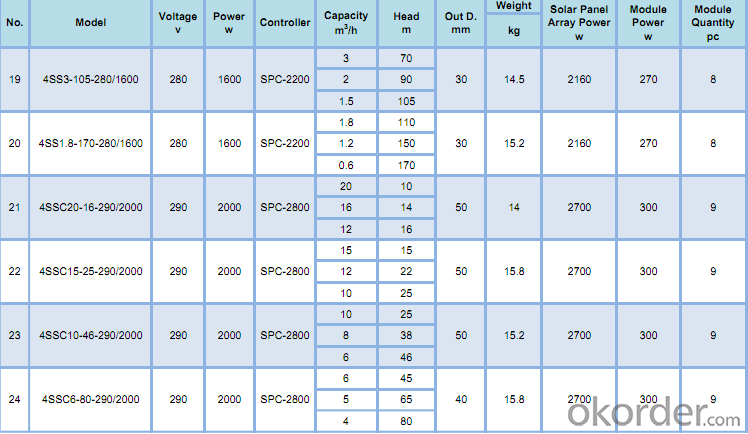
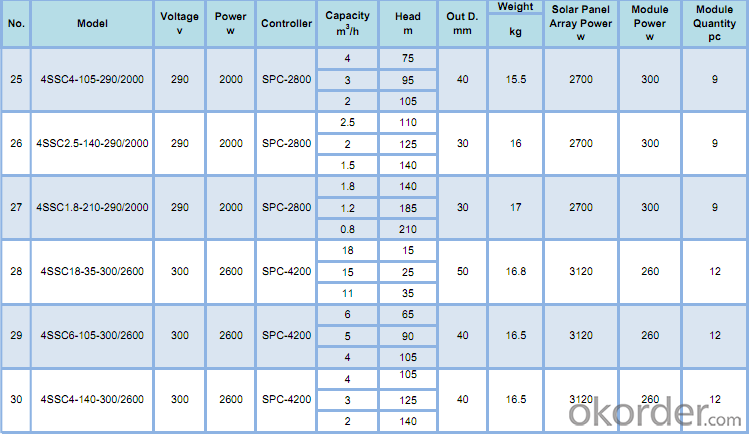
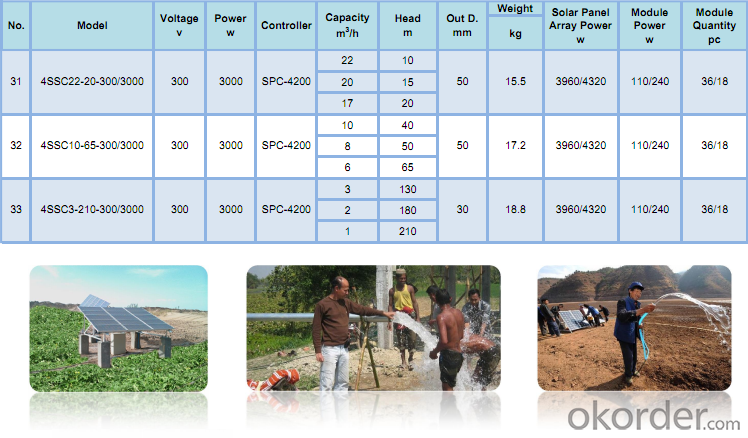
- Q: Are there any limitations to the suction lift capability of a solar pump?
- Yes, there are limitations to the suction lift capability of a solar pump. One major limitation is the maximum suction lift height that the pump can achieve. Solar pumps typically have a maximum suction lift height, which is the vertical distance from the water source to the pump. If this height exceeds the pump's capability, it will not be able to lift the water effectively. Another limitation is the efficiency of the pump. Solar pumps rely on solar energy to power their operation, and the efficiency of converting solar energy into pumping power can vary. If the pump has low efficiency, it may struggle to achieve the desired suction lift capability. Additionally, the capacity of the pump and the size of the solar panels can also affect the suction lift capability. If the pump is undersized or the solar panels are not generating enough power, the suction lift capability may be limited. Furthermore, the type and condition of the suction pipe can impact the pump's performance. If the pipe is too narrow or has leaks, it can reduce the suction lift capability. It is important to consider these limitations and ensure that the chosen solar pump is suitable for the desired suction lift requirements. Consulting with a professional or the manufacturer can help determine the appropriate pump for specific needs.
- Q: Can a solar pump be used for fountains?
- Certainly! Fountains can absolutely make use of solar pumps. These pumps are specifically engineered to operate on solar energy, which transforms sunlight into electricity to power the pump. Consequently, they serve as an excellent choice for fountains since they eliminate the requirement for conventional electricity sources. Additionally, solar pumps are generally simple to install and upkeep, offering a sustainable and eco-friendly alternative for fueling fountains. They are suitable for both small and large fountains, making them a favored option for garden or backyard fountains.
- Q: Can a solar pump be used in areas with limited access to water supply?
- Yes, a solar pump can be used in areas with limited access to water supply. Solar pumps are powered by sunlight and do not require grid electricity or fuel, making them a suitable solution for remote or off-grid locations. They can draw water from various sources such as wells, boreholes, or rivers, enabling access to water even in areas with limited infrastructure. Additionally, solar pumps are often designed to be low-maintenance and have a long lifespan, making them a sustainable and reliable option for water supply in such areas.
- Q: Are solar pumps suitable for use in mountainous regions with varying elevation?
- Yes, solar pumps are suitable for use in mountainous regions with varying elevation. Solar pumps are versatile and can be installed in different terrains, including mountainous areas. They are powered by solar energy, making them independent of electricity grids, which is particularly advantageous in remote regions. Additionally, solar pumps can adjust their pumping capacity based on the available sunlight, making them adaptable to the varying elevation and sunlight conditions of mountainous regions.
- Q: Can a solar pump be used in commercial car wash facilities?
- Indeed, commercial car wash facilities can utilize solar pumps. Solar pumps present an environmentally friendly and cost-effective solution for water pumping necessities, rendering them an appropriate option for sustainability-focused enterprises. By harnessing energy from the sun, solar pumps obviate the necessity for grid electricity or diesel generators. Their versatility enables their application in various capacities within car wash facilities, including water circulation, pressure washing, and water tank replenishment. Moreover, solar pumps contribute to reduced operational costs through diminished energy expenses and maintenance requirements. Nevertheless, it is crucial to meticulously evaluate the specific prerequisites of the car wash facility and ensure that the selected solar pump possesses the requisite capacity and capabilities to meet the facility's water pumping demands.
- Q: Can solar pumps be used for water supply in schools or orphanages in developing countries?
- Yes, solar pumps can definitely be used for water supply in schools or orphanages in developing countries. Solar pumps are a reliable and cost-effective solution for providing a consistent water supply in areas with limited access to electricity or unreliable power grids. They can help ensure a sustainable and uninterrupted water source, contributing to the health and well-being of students or children in orphanages. Additionally, solar pumps are environmentally friendly and can help reduce operational costs in the long run, making them a suitable option for these institutions in developing countries.
- Q: Can a solar pump be used in residential swimming pools?
- Yes, a solar pump can be used in residential swimming pools. Solar pumps use energy from the sun to circulate and filter the pool water, reducing electricity costs and environmental impact. They are a sustainable and efficient option for residential pool owners.
- Q: What is the required voltage for a solar pump?
- The required voltage for a solar pump can vary depending on the specific model and application. However, most solar pumps operate using a low voltage direct current (DC) power source, typically ranging from 12 to 48 volts.
- Q: Are there any limitations to using a solar pump?
- There exist certain constraints when using a solar pump. One primary constraint is the reliance of solar pumps on sunlight for their operation. This implies that their effectiveness and efficiency may be compromised on cloudy or rainy days, or in regions with limited sunlight. The performance of the pump is directly impacted by the amount of power generated by the solar panels, so insufficient sunlight may hinder optimal functioning. Another limitation pertains to the initial cost of installing a solar pump system. Although solar pumps can yield long-term savings by reducing electricity bills, the upfront expenses can be substantial. These costs encompass not only the pump itself, but also the solar panels, batteries, and other necessary components. Consequently, individuals or communities with limited financial resources may find them less accessible. Furthermore, adequate space is required for the installation of solar panels. The panels must be positioned in a manner that maximizes exposure to sunlight, necessitating a large open area or an unobstructed rooftop. In certain urban or densely populated areas, finding suitable space for solar panels can pose a challenge. Maintenance and repair also present a constraint. Regular maintenance is essential to ensure the efficient operation of solar pumps, involving tasks such as cleaning the solar panels, inspecting connections, and examining other components. In the event of a malfunction or breakage, finding specialized technicians or spare parts may prove more difficult compared to conventional pumps. Lastly, the capacity of solar pumps can be limited. They may not be suitable for applications with high water flow or pressure demands. Larger-scale agricultural or industrial operations might require more powerful pumps that solar energy alone cannot provide. Despite these limitations, solar pumps offer numerous advantages, including energy efficiency, environmental friendliness, and long-term cost savings. It is crucial to carefully evaluate the specific requirements and limitations of your situation before opting for a solar pump.
- Q: Can a solar pump be used for water fountains or decorative purposes?
- Certainly, water fountains or decorative purposes can indeed make use of a solar pump. Solar pumps are designed specifically to harness solar energy for the operation of water pumps, thereby presenting a sustainable and eco-friendly choice for various applications, such as water fountains and decorative water features. These pumps typically consist of a solar panel that converts sunlight into electricity, which is then utilized to power the water pump. Depending on the specific requirements of the water fountain or decorative feature, the size and capacity of the solar pump may vary, but they generally offer ample water flow and pressure to create stunning water displays. Moreover, solar pumps possess the advantage of being self-sufficient, eliminating the need for external power sources, thus facilitating easy installation and maintenance.
Send your message to us
Solar Pump Water Fountain - Cheap Solar Panels for Solar Pool Heating and Solar Water Pumping
- Loading Port:
- Shanghai
- Payment Terms:
- TT OR LC
- Min Order Qty:
- 1 set
- Supply Capability:
- 1000 set/month
OKorder Service Pledge
OKorder Financial Service
Similar products
Hot products
Hot Searches
Related keywords
